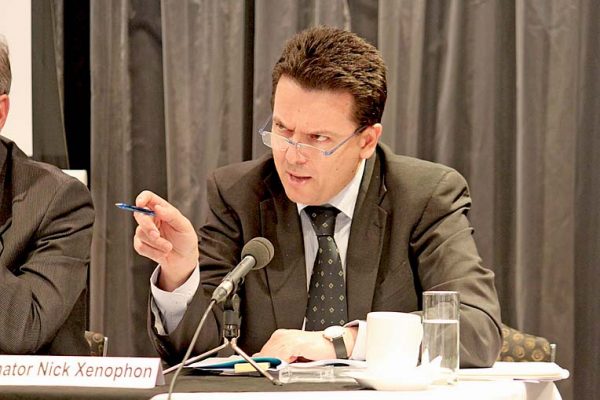

PROSPECTIVE candidates for Nick Xenophon’s SA-Best party will stump up $1000 to apply, $20,000 to run and a cut of their parliamentary income if elected to parliament at the state election.
The party will earn more than $19,000 per year for each member elected to parliament, with internal SA-BEST party material outlining a “contribution from base parliamentary salary” of up to 10pc.
The base parliamentary salary for South Australian is currently $191,324.
The document, provided to The South Eastern Times, details the non-refundable $1000 application fee for aspiring candidates and the upfront $20,000 payment before party preselection.
Nick Xenophon’s SA-BEST Deed for Candidates says the application fee is a contribution to administration costs and a review of the candidate’s application, including interviews and training.
A source told The South Eastern Times SA-BEST pocketed $16,000 at the party’s executive committee nominations committee review held in Adelaide on November 25.
The insider said 16 nominees from one of the party’s four state branches, which encompasses electorates within the South East and the Riverland, paid the compulsory $1000 fee before presenting to SA-BEST’s executive committee.
It is understood nominees in three other SA-BEST branches have recently fronted the party’s preselection process.
The deed says endorsed candidates must pay SA-BEST $20,000 for a state campaign fund contribution, which is intended to help the party with campaign costs.
It continues to state the party is entitled to use, pay and apply the contribution to campaigning as “determined by the management committee”.
SA-BEST leader Mr Xenophon defended the fees, saying the costs of running election campaigns were high.
“The state campaign fee is $20,000, but the actual cost is much more than that,” he said.
“You’re looking at $4000-$5000 on corflutes, running ads across the entire state is a lot of money and there are costs of running a small campaign office and social media management.
“We are doing this on a shoestring, we’re just being upfront and honest.
“It’s a bit rich for the major parties to be complaining when they have big business and big unions backing them.”
Mr Xenophon’s state election costs came under the spotlight in 2007 when former running mate Ann Bressington told a joint parliamentary hearing Mr Xenophon asked her to pay $50,000 in campaign expenses after being elected.
Ms Bressington, who was elected to the Upper House in 2006 on the back of the independent No Pokies ticket, told the chamber Mr Xenophon requested a further $22,000 to contribute to the “Nick Xenophon calendar of stunts” as a fundraising effort.
Mr Xenophon, who has left federal parliament to contest the Liberal-held eastern Adelaide seat of Hartley, launched his new state-based political party in March, offering an alternative to the major party duopoly.
Earlier this year, Mr Xenophon was non-commital in his decision to field a candidate in MacKillop, but indicated he would target the seat of Mount Gambier.
SA-BEST currently has six Lower House candidates that will run in the election, targeting the seats of Waite, Mawson, Hammond, Morphett, Heysen and Hartley.
The SA-BEST website states further House of Assembly candidates will be announced in coming months, while Legislative Council candidates will be announced in early 2018.
Expressions of interest from “community advocates” who wish to stand as candidates in electorates that have not been formally announced remain open.







